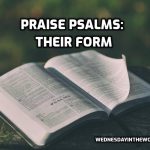When I was a new believer, the words of Jesus were baffling. Thankfully, I’ve grown to understand him. I have reached two conclusions about the teaching of Jesus.
101Genre
Psalms of Praise: Their form
75% of Psalms are 1 of three main types: lament, thanksgiving or praise. Here is the general form for praise psalms.
Psalms of Lament: Their form
75% of Psalms are 1 of three main types: lament, thanksgiving or praise. Here is the general form for lament psalms.
Psalms of Thanksgiving: Their form
75% of Psalms are 1 of three main types: lament, thanksgiving or praise. Here is the general form for Thanksgiving psalms.
Gospels: how to understand the Gospels
The gospels are unique in content, although they are similar in form to ancient biographies.
Revelation: Understanding Apocalyptic literature
Apocalyptic literature is a sub-category of prophecy. The name comes from the Greek word apocalypsis which means uncovering or unveiling.
Hebrew Poetry: How to understand psalms and wisdom literature
The key to understanding Hebrew poetry and Wisdom Literature is knowing that the “rhyme” of ideas is more important than the sounds. This “rhyming” of ideas is called parallelism.
Narratives: how to understand OT stories
Narratives are true stories. Over 40% of the Old Testament Scriptures are narratives. Generally, the purpose of a biblical narrative is to show the Lord at work in His creation. Every genre found in the Bible presents unique challenges for understanding. Narratives are no exception. With narratives we think in scenes, plot and character, rather than paragraphs and outlines.
Prophecy: how to understanding OT prophets
Studying biblical prophecy is an often overwhelming task. Much of it is written in Hebrew poetry. The names and places are foreign, and the metaphors don’t always resonate with our modern ears. Yet we can usually understand the main point. If studying an Old Testament prophet overwhelms you, here are some tips to get you started.
Epistles: How to understand NT letters
Every genre found in the Bible presents unique challenges for understanding. Here are guidelines for studying epistles.










